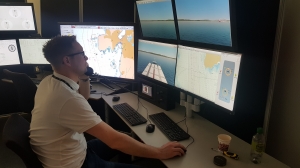


(Posted on 30/11/21)
Classification society DNV has introduced the shipping industry’s first competence standard for vessel remote control centre operators (RCCO). The standard is supported by a new recommended practice that offers a certification scheme for RCCOs. Together, they provide a framework for training, assessing, and certifying personnel working in remote-control centres that support or manage operations at sea.
Intelligent software systems and enhanced ship-to-shore-connectivity have laid the groundwork for the growth of remote solutions and autonomy in shipping. Unmanned vessels are already expected to begin operations in the near future.
Ensuring that these vessels operate at an equivalent level of safety is essential to building confidence and realizing the potential of these technologies. However, despite the technical solutions being in place, competence requirements for those monitoring, supporting and/or controlling these ships have not been defined.
The new DNV competence standard for remote control centre operators (DNV-ST-0324) and the supporting recommended practice (DNV-RP-0323) change this. They were developed in collaboration with Kongsberg Maritime, Wilhelmsen, as well as the University of South-Eastern Norway, and the Norwegian Maritime Authority.
“Making sure that shore-based staff are prepared for autonomous, remote-controlled or remotely supported operations at sea is a big challenge,” said Torsten Schröder, SeaSkill™ Service Manager, Competence & Learning at DNV Maritime. “Because when it comes the wider application of these technologies, trust in the systems, and the people managing these operations is paramount. This is why we are so pleased to have developed the RP with expert partners from across the industry. Having a wide range of expertise was essential to devising a uniform and controlled approach to the training, assessment and certification of RCCOs.”
The recommended practice, DNV-RP-0323, gives guidance to centres conducting examinations of remote-control centre operators and issuing personnel certificates as a certification body. It also covers the competence building process for candidates before undertaking an RCCO examination, for example learning programmes and practice sessions in the centres themselves.
The DNV SeaSkill standard ST-0324 provides a foundation for the entire process. It lists the required competencies for the operation of autonomous or remotely controlled and/or supported ships.
DNV is the world’s leading classification society and a recognized advisor for the maritime industry. We enhance safety, quality, energy efficiency and environmental performance of the global shipping industry – across all vessel types and offshore structures.
We invest heavily in research and development to find solutions, together with the industry, that address strategic, operational or regulatory challenges.
Torvald Klaveness has announced the decision to consolidate all digital services under Klaveness Digital... Read more
The International Association of Dry Cargo Shipowners (INTERCARGO) has renewed its call for straightforward... Read more
The Swedish Club has delivered strong results for 2024, posting a USD 34 million profit and significantly... Read more
In line with NORDEN’s positive long-term outlook for Capesize freight rates, the company have... Read more
OrbitMI, a global provider of maritime software and data products, has expanded its workflow capabilities... Read more
Current ClassNK Senior Vice President Hayato Suga has been appointed as President & CEO as well... Read more
The surge in demand for Cape Size bulk carriers will continue for another six weeks, driven on by increased... Read more
OrbitMI, a leading provider of maritime SaaS software, has announced that Istanbul-based Statu Shipping... Read more
“The International Association of Dry Cargo Shipowners (INTERCARGO) is deeply saddened by the... Read more
As the shipping industry continues its transition to carbon-neutral fuels, ammonia and hydrogen are... Read more